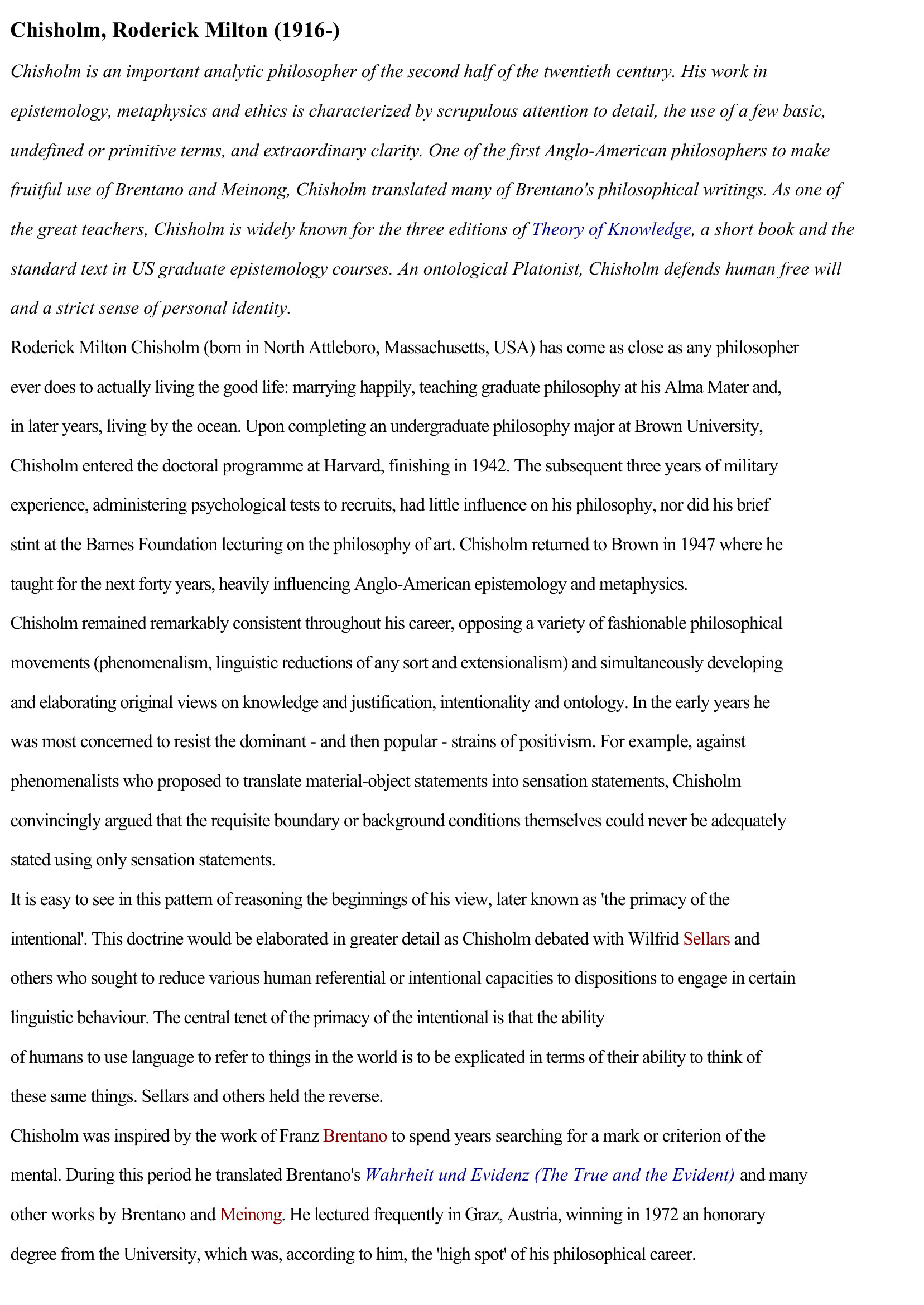Chisholm, Roderick Milton
Extrait du document
«
Chisholm, Roderick Milton (1916-)
Chisholm is an important analytic philosopher of the second half of the twentieth century.
His work in
epistemology, metaphysics and ethics is characterized by scrupulous attention to detail, the use of a few basic,
undefined or primitive terms, and extraordinary clarity.
One of the first Anglo-American philosophers to make
fruitful use of Brentano and Meinong, Chisholm translated many of Brentano's philosophical writings.
As one of
the great teachers, Chisholm is widely known for the three editions of Theory of Knowledge, a short book and the
standard text in US graduate epistemology courses.
An ontological Platonist, Chisholm defends human free will
and a strict sense of personal identity.
Roderick Milton Chisholm (born in North Attleboro, Massachusetts, USA) has come as close as any philosopher
ever does to actually living the good life: marrying happily, teaching graduate philosophy at his Alma Mater and,
in later years, living by the ocean.
Upon completing an undergraduate philosophy major at Brown University,
Chisholm entered the doctoral programme at Harvard, finishing in 1942.
The subsequent three years of military
experience, administering psychological tests to recruits, had little influence on his philosophy, nor did his brief
stint at the Barnes Foundation lecturing on the philosophy of art.
Chisholm returned to Brown in 1947 where he
taught for the next forty years, heavily influencing Anglo-American epistemology and metaphysics.
Chisholm remained remarkably consistent throughout his career, opposing a variety of fashionable philosophical
movements (phenomenalism, linguistic reductions of any sort and extensionalism) and simultaneously developing
and elaborating original views on knowledge and justification, intentionality and ontology.
In the early years he
was most concerned to resist the dominant - and then popular - strains of positivism.
For example, against
phenomenalists who proposed to translate material-object statements into sensation statements, Chisholm
convincingly argued that the requisite boundary or background conditions themselves could never be adequately
stated using only sensation statements.
It is easy to see in this pattern of reasoning the beginnings of his view, later known as 'the primacy of the
intentional'.
This doctrine would be elaborated in greater detail as Chisholm debated with Wilfrid Sellars and
others who sought to reduce various human referential or intentional capacities to dispositions to engage in certain
linguistic behaviour.
The central tenet of the primacy of the intentional is that the ability
of humans to use language to refer to things in the world is to be explicated in terms of their ability to think of
these same things.
Sellars and others held the reverse.
Chisholm was inspired by the work of Franz Brentano to spend years searching for a mark or criterion of the
mental.
During this period he translated Brentano's Wahrheit und Evidenz (The True and the Evident) and many
other works by Brentano and Meinong.
He lectured frequently in Graz, Austria, winning in 1972 an honorary
degree from the University, which was, according to him, the 'high spot' of his philosophical career..
»
↓↓↓ APERÇU DU DOCUMENT ↓↓↓

































